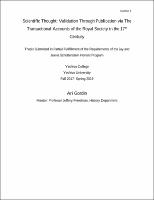Please use this identifier to cite or link to this item:
https://hdl.handle.net/20.500.12202/4777Full metadata record
| DC Field | Value | Language |
|---|---|---|
| dc.contributor.advisor | Freedman, Jeffrey | - |
| dc.contributor.author | Gordin, Ari | - |
| dc.date.accessioned | 2019-10-28T20:32:41Z | - |
| dc.date.available | 2019-10-28T20:32:41Z | - |
| dc.date.issued | 2019 | - |
| dc.identifier.citation | Gordin, Ari. (Fall 2017-Spring 2019). Scientific Thought: Validation Through Publication via The Transactional Accounts of the Royal Society in the 17th Century Thesis Submitted in Partial Fulfillment of the Requirements of the Jay and Jeanie Schottenstein Honors Program. Yeshiva College, Yeshiva University. | en_US |
| dc.identifier.uri | https://hdl.handle.net/20.500.12202/4777 | - |
| dc.description | Senior honors thesis | en_US |
| dc.description.abstract | The age of the Internet has transformed scholarly publishing from a closed and highly scrutinized process to a relatively unsupervised and open online affair. Predatory scientific journals have emerged online and solicit contributions from young researchers anxious to publish their work; the plethora of scientific journals has led to confusions over validity within the scientific community. The skepticism necessary for scientific progress has receded leading to a rightful shock whenever a researcher is found to have made fraudulent claims. Standards and perhaps even certain ethical principals that date back to the seventieth century have become questionable in the face of the constant and revolutionary progress of research. --- The Philosophical Transactions of the Royal Society of London could be considered the earliest scientific periodical. The fellows of the Royal Society of London emerged as the leading scientific society in the English-speaking world due to their adherence to a set of standards proposed by Francis Bacon and implemented by Henry Oldenburg and Robert Boyle among other prominent academy fellows. These standards created a framework for evaluating claims to knowledge about the natural world, aiding both the respected and amateur scientist in their attempts to describe discoveries to the reading public. The Transactional Accounts of the Royal Society published periodically and edited by Henry Oldenburg legitimized scientific discoveries in an era in which the criteria for evaluating them had not yet been formalized. The publication and organization of the society served as a model for future royal academies of science. In order to grasp the significance of the Philosophical Transactions, we need to situate that publication within the broader context of the paradigm shift in thought and understanding of the natural world termed ‘The Scientific Revolution,’ which occurred in Europe during the 16th and 17th centuries. | en_US |
| dc.description.sponsorship | Jay and Jeanie Schottenstein Honors Program | en_US |
| dc.language.iso | en_US | en_US |
| dc.publisher | NY: Yeshiva College. Yeshiva University. | en_US |
| dc.subject | Senior honors thesis | en_US |
| dc.subject | Scientific thought | en_US |
| dc.subject | Validation through publication | en_US |
| dc.subject | Royal Society of London -- 17th Century | en_US |
| dc.subject | Philosophical transactions | en_US |
| dc.title | Scientific Thought: Validation Through Publication via The Transactional Accounts of the Royal Society in the 17th Century | en_US |
| dc.type | Thesis | en_US |
| Appears in Collections: | Jay and Jeanie Schottenstein Honors Student Theses | |
Files in This Item:
| File | Description | Size | Format | |
|---|---|---|---|---|
| Ari Gordin Senior Honors Thesis.pdf | 447.11 kB | Adobe PDF |  View/Open |
Items in DSpace are protected by copyright, with all rights reserved, unless otherwise indicated.
